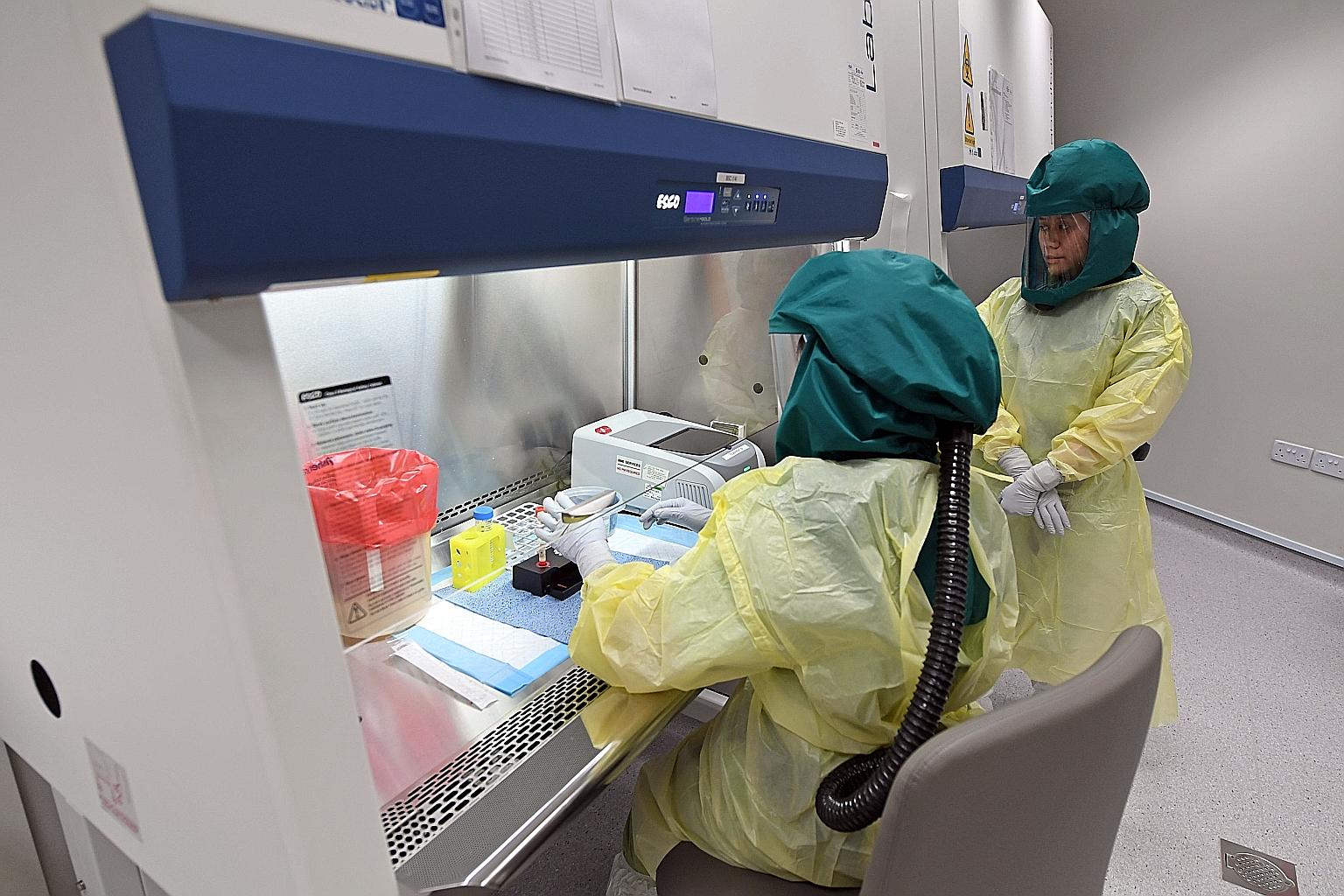China battles to contain Wuhan virus ahead of new year travel crunch
WHO will decide today if outbreak is global health emergency; jitters in stock markets
Sign up now: Get insights on Asia's fast-moving developments

Laboratory technicians doing tests in the National Public Health laboratory at the National Centre for Infectious Diseases in Singapore. All suspected Wuhan cases will be sent straight to the centre, to nip the spread of the virus in the bud.
ST PHOTO: DESMOND FOO
Tan Dawn Wei China Bureau Chief In Beijing, Tan Dawn Wei
Follow topic:
The fallout from the Wuhan pneumonia outbreak widened yesterday as the number of infections rose, stock markets plunged globally and several countries braced themselves for the virus reaching their shores.
The World Health Organisation (WHO) said it would hold a meeting in Geneva today to determine if the outbreak is a global public health emergency.
The death toll in China has risen to six, as infections continue to spread after health officials confirmed the disease is now being transmitted from human to human.
There is an added urgency to contain the virus, with millions expected to travel across the country for Chinese New Year celebrations.
As of last night, the number of infected people had increased to 314 from 291 cases at the end of Monday, and spread to other cities and provinces. Five new cases were discovered in Chongqing, and one each in Shandong province and Sichuan province.
Taiwan reported its first case yesterday - a Taiwanese woman in her 50s who had returned from Wuhan, adding to four cases discovered earlier in South Korea, Japan and Thailand.
Experts confirmed that the virus has mutated and is now spreading from human to human.
As many as 15 healthcare workers in Wuhan have also fallen ill, with one in critical condition.
The authorities in Wuhan, the capital of Hubei province, stepped up screenings of people entering and leaving the city, with traffic police scanning vehicles to check for poultry or wildlife animals.
Chinese New Year celebrations have been cancelled while travel agencies have been forced to suspend tour groups out of Wuhan.
Infrared thermometers have also been installed at airports, railway stations and bus stations in the city of 11 million.
Wuhan Mayor Zhou Xianwang urged people not to travel into or out of the city, while rail operators offered to refund tickets for free.
A group of infectious disease experts from the University of Hong Kong estimated that as many as 1,300 people have already been infected, and that the virus has spread to at least 20 cities on the mainland.
"It is absolutely critical that the public health authorities recognise a super-spreading event in the very earliest stages, before it goes absolutely explosive," said Professor Gabriel Leung, the university's dean of medicine.
Chinese officials are battling to contain the spread of the disease ahead of the Chinese New Year travel crunch from tomorrow.
The task has been made more difficult. "The virus is adapting to the environment and adapting to humans," said virologist Gao Fu.
The outbreak sent jitters across stock markets globally, with memories of the economic devastation caused by the severe acute respiratory syndrome (Sars) still fresh.
Hong Kong, which suffered badly during the Sars outbreak, saw its index fall 2.8 per cent. Japan's Nikkei lost 0.9 per cent, Singapore stocks fell 1 per cent and Shanghai blue chips, 1.7 per cent.
Airline stocks came under pressure over fears that travel and tourism would be hit. Even European luxury goods makers, with exposure to China, took a hammering.
Singapore's Ministry of Health yesterday said it was widening the definition of suspected cases - who would be quarantined - to include those with acute respiratory infection who had been to any hospital in China within two weeks of the symptoms appearing.
Changi Airport is expanding temperature screenings to all incoming flights from China from today. Other countries like the United States, Japan, South Korea and Australia have also introduced stringent checks of travellers from Wuhan.
The initial cases of the outbreak were linked to a wholesale market in Wuhan that sold a variety of wildlife, including birds, snakes and foxes, but the health authorities say they do not yet know the source of the virus.
The Communist Party's top law and order body yesterday warned officials not to withhold information on the spread of the virus, reminding them of the lessons from the Sars outbreak. The authorities had initially tried to cover up the 2003 epidemic that killed nearly 800 people.

